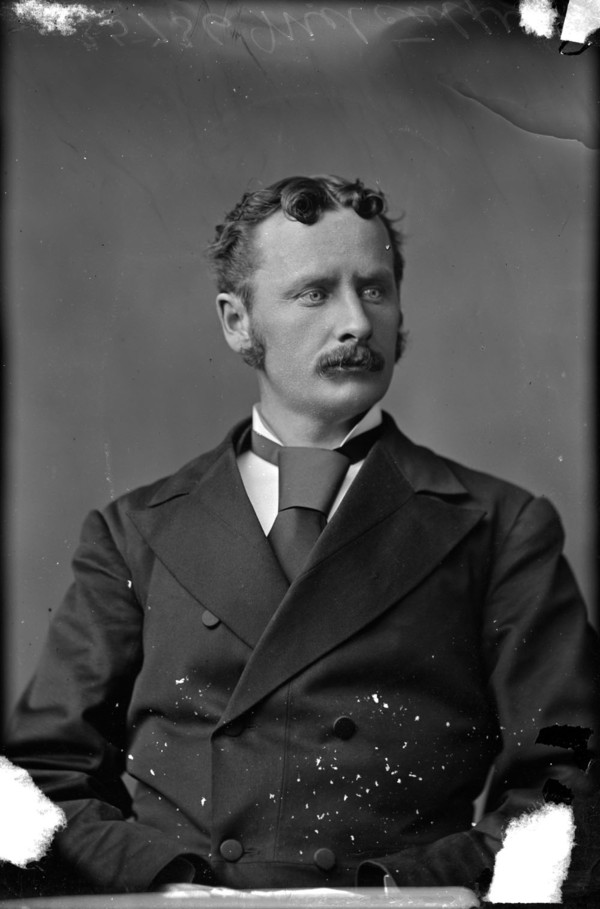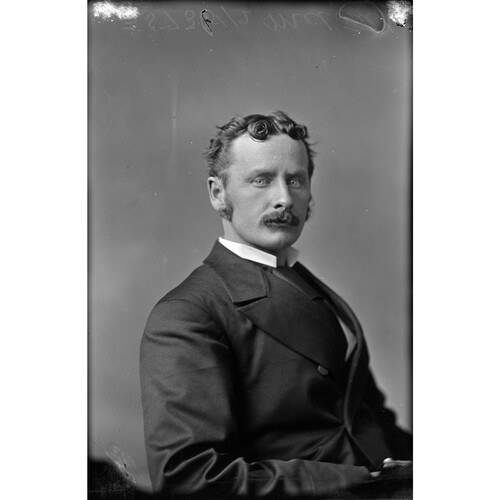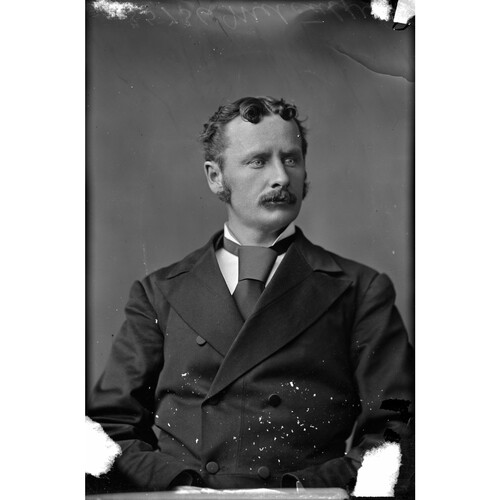METCALF, WILLIAM GEORGE, physician; b. 4 July 1847 in Uxbridge, Canada West, son of George Metcalf and Jane Morphet, who had immigrated from England in 1845; m. first 31 May 1876 Alice Elizabeth Bustin of Uxbridge, and they had three children; m. secondly 21 June 1883 Emma Clarke of Elora, Ont., daughter of the Honourable Charles Clarke*; d. 16 Aug. 1885 in Kingston, Ont.
William George Metcalf received his elementary education in Uxbridge, except for five years when the family lived in Ashburn in Whitby Township. In 1870 he entered the Toronto School of Medicine which was affiliated with the University of Toronto. The university class and prize list for mb candidates in 1872 records that Metcalf stood first in surgery, second in medical jurisprudence, third in obstetrics, and fourth in medicine. He became a member of the College of Physicians and Surgeons of Ontario on 12 April 1872 and received his md in 1874.
In 1870, as a medical student, Metcalf had served under Dr Joseph Workman*, superintendent of the Toronto Lunatic Asylum, and had become his clinical assistant on 7 Aug. 1871. After obtaining his md, Metcalf practised medicine in Windsor, Ont., for a few months before returning to the Toronto asylum when Workman retired in July 1875. He remained there until June 1877, then transferred to the asylum at London as assistant medical superintendent to Dr Richard Maurice Bucke*. Less than a year later, on 4 April 1878, Metcalf was appointed acting superintendent of the Rockwood Asylum, Kingston, when illness incapacitated Dr John Robinson Dickson. After Dickson’s resignation Metcalf was appointed medical superintendent on 20 June 1879. John Woodburn Langmuir*, the inspector of asylums in Ontario, set his annual salary at $1,600.
The year before Metcalf arrived at Rockwood the control of the institution had been transferred from the federal to the provincial government. This transfer severed the asylum’s connection with the federal penitentiary in Kingston and Metcalf was faced with the difficult task of transforming the institution from an asylum for criminal lunatics into a hospital for the mentally ill. He concentrated on developing the programme of increasingly humane treatment of patients which had begun under Dr John Palmer Litchfield* and continued under Dickson. He abolished physical restraint and instituted occupational and recreational activities ranging from tending the garden which supplied the kitchen to dances and concerts. His journal records his progress. On 25 Feb. 1880, he wrote, “Entertainment – The asylum dramatic club gave their first performance this evening, assisted by others from the city. ‘The Stage-struck Clerk’ was put on the boards and for the first attempt was very creditable.”
In 1882 Metcalf persuaded his friend and future brother-in-law, Dr Charles Kirk Clarke*, to come to Kingston as assistant superintendent. Both had been pupils of Workman and their partnership provided a long-awaited opportunity to put the ideas they had discussed many years before into practice. Metcalf’s annual reports after 1882 indicate their many innovations. From an essentially custodial institution, the asylum at Kingston became a model of its kind which attracted distinguished visitors. Among them was Daniel Hack Tuke, a celebrated English authority on mental hospitals, who in 1884 expressed himself as “well satisfied with the condition of things here.”
In 1882 Bucke had initiated an “open door” policy at the London asylum to increase the patients’ sense of freedom. The system, soon instituted at the Kingston asylum, was not without risk. It was, however, particularly tragic that Metcalf should become a fatal victim of his own reforms. On the morning of 13 Aug. 1885, while Metcalf and Clarke were making their rounds, Metcalf was stabbed in the abdomen by Patrick Maloney, a patient suffering from paranoia. Despite all efforts to save him Metcalf died on 16 Aug. 1885 and Maloney was charged with murder. At Metcalf’s funeral the pallbearers included doctors Workman, Daniel Clark*, Bucke, Charles William Covernton, William Osler*, and architect Kivas Tully*.
Because of his youth and inexperience Metcalf’s appointment as medical superintendent had been criticized in the provincial legislature. Despite this inauspicious start he had soon proved himself to be an extremely competent and courageous administrator. In less than seven years he succeeded in overcoming the opposition of a staff whose attitude towards patients was extremely punitive. His achievement in transforming Rockwood from a custodial institution for insane criminals into a general asylum earned him the respect of his medical colleagues throughout Canada and the United States. His untimely death at the hands of a patient liberated by the “open door” policy had particular poignancy.
AO, RG 10, ser.20-F, Asylum for the Insane (Kingston, Ont.), Medical superintendent’s journal, 1880–89. Asylum for the Insane, Kingston, Annual report (Kingston), 1878–79. Dominion annual register, 1885. The Ontario medical register . . . (Toronto), 1874. Cyril Greenland, Charles Kirk Clarke: a pioneer of Canadian psychiatry (Toronto, 1966). The institutional care of the insane in the United States and Canada, ed. H. M. Hurd (4v., Baltimore, Md., 1916–17; repr. New York, 1973), IV.
Cite This Article
Cyril Greenland, “METCALF, WILLIAM GEORGE,” in Dictionary of Canadian Biography, vol. 11, University of Toronto/Université Laval, 2003–, accessed February 28, 2026, https://www.biographi.ca/en/bio/metcalf_william_george_11E.html.
The citation above shows the format for footnotes and endnotes according to the Chicago manual of style (16th edition). Information to be used in other citation formats:
| Permalink: | https://www.biographi.ca/en/bio/metcalf_william_george_11E.html |
| Author of Article: | Cyril Greenland |
| Title of Article: | METCALF, WILLIAM GEORGE |
| Publication Name: | Dictionary of Canadian Biography, vol. 11 |
| Publisher: | University of Toronto/Université Laval |
| Year of publication: | 1982 |
| Year of revision: | 1982 |
| Access Date: | February 28, 2026 |





